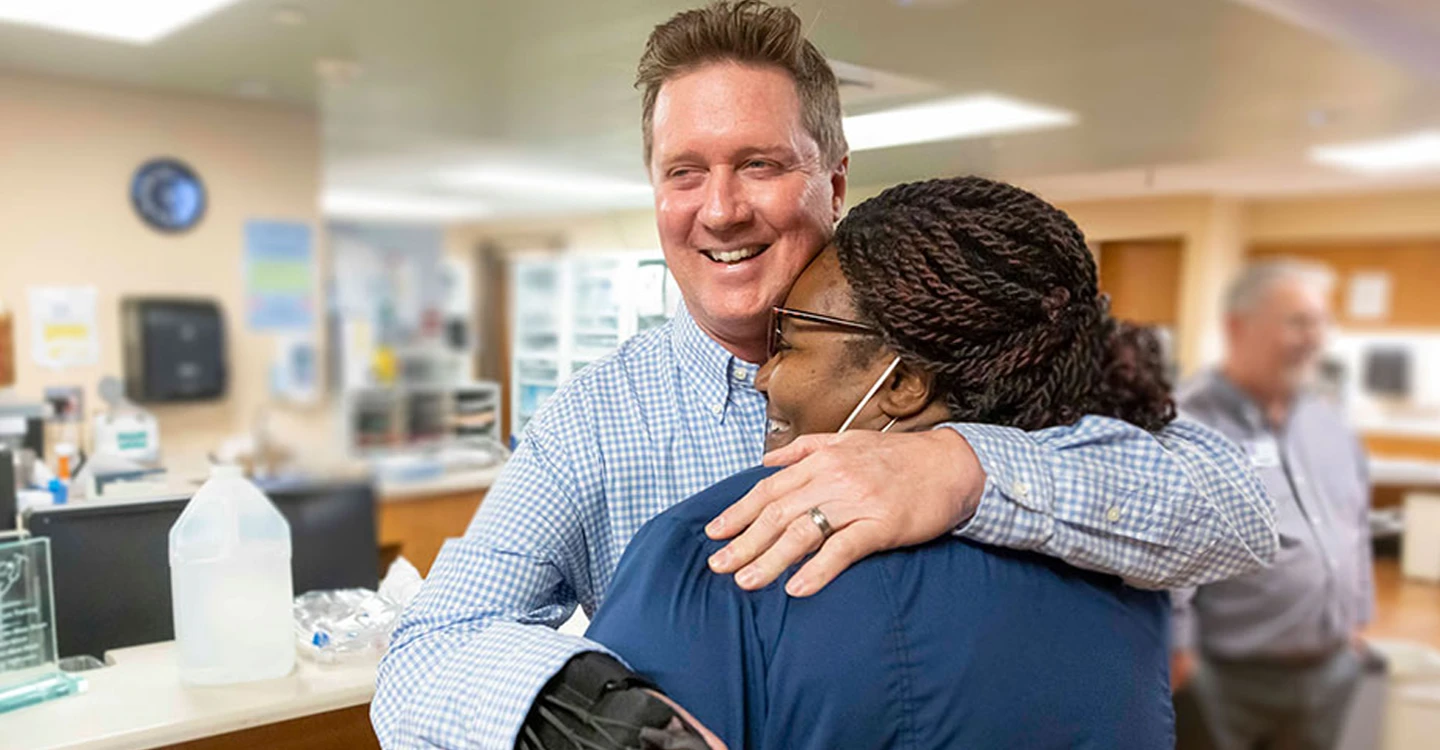ROME, Ga., Sept. 27, 2023 – Over the past year, a poignant incident helped illustrate the extraordinary care provided at Atrium Health Floyd's Level II Trauma Center.
Andy Turner was participating in a motocross event when he lost control of his motorcycle and crashed head-first into a tree. He was transported to Atrium Health Floyd Medical Center for treatment of a head injury, 12 broken ribs, six broken vertebrae, a broken scapula, a collapsed lung, a lacerated liver, damaged kidneys and a bruised heart.
Turner's wife, Kaci, said those hours in the emergency care center (ECC) were a blur. Still, she remembers the words of trauma director Dr. Mac McKemie, who told her that her husband's recovery would be a marathon, not a sprint. He also offered the sage advice to forget the bad days and remember the good ones.
A full year after his wreck, Andy Turner returned to Floyd with his family to thank the doctors, nurses and other clinicians who cared for him. It was a beautiful reunion for Kaci Turner, and a great first-time meeting for Andy Turner, who has no memory of his time at Floyd. He only knew what his family had told him, but their stories made him certain of one thing: he wanted to return to the ECC and the Intensive Care Unit so he could personally thank his caregivers.
The room was filled with smiles, hugs and tears. Physicians told Turner they really didn't know if he was going to survive his injuries. Dr. McKemie told the Turners that ER and ICU doctors and nurses seldom get to actually have an actual conversation with their most severely injured patients, many times don't know their outcomes and almost never receive a “thank you," from them. Turner's visit was good medicine for him and for his caregivers.
Next month, Atrium Health Floyd will open a stand-alone emergency department in Chattooga County, bringing accessible emergency care conveniently close for residents and workers who live and work in the rural county. That emergency facility will include a helipad that can quickly transport a patient to our Trauma Center should there be a need. And just this month the American College of Surgeons (ACS) awarded Atrium Health Floyd its verification as a Level II Trauma Center.
Floyd has been a state-designated trauma center since 1981. That's when the state of Georgia first designated trauma centers, and Floyd was the first. Since then, the ACS has taken on the role of verifying the emergency departments that provide care to the most severely injured patients. Their requirements are much more involved, but the verification ensures Floyd Medical Center will continue to receive trauma funding. Over the past three years, Floyd has invested millions of dollars in its Trauma Center to ensure it meets those more-stringent Level II requirements.
Dr. McKemie leads an incredibly strong and gifted team of highly trained clinicians who ensure round-the-clock trauma care is available right here in Rome. Atrium Health Floyd Medical Center has two traumatologists, always-available surgery and specialists in orthopedics and neurosurgery.
In 2022, a raised helipad with direct access to the trauma center was installed, and beneath it a decontamination area for patients who have been injured by harsh chemicals was added.
Atrium Health Floyd spent those millions of dollars to build the helipad, pays clinicians to be always available and invested in ambulances and equipment for patients like Turner, who, when he returned to Floyd last April, introduced a new family member to Dr. McKemie and the others. The couple brought along Collins, their granddaughter, who, thanks to the life-saving care Turner received at Floyd, was able to celebrate her first birthday last week, on Sept. 21, with her now-recovered grandfather.
